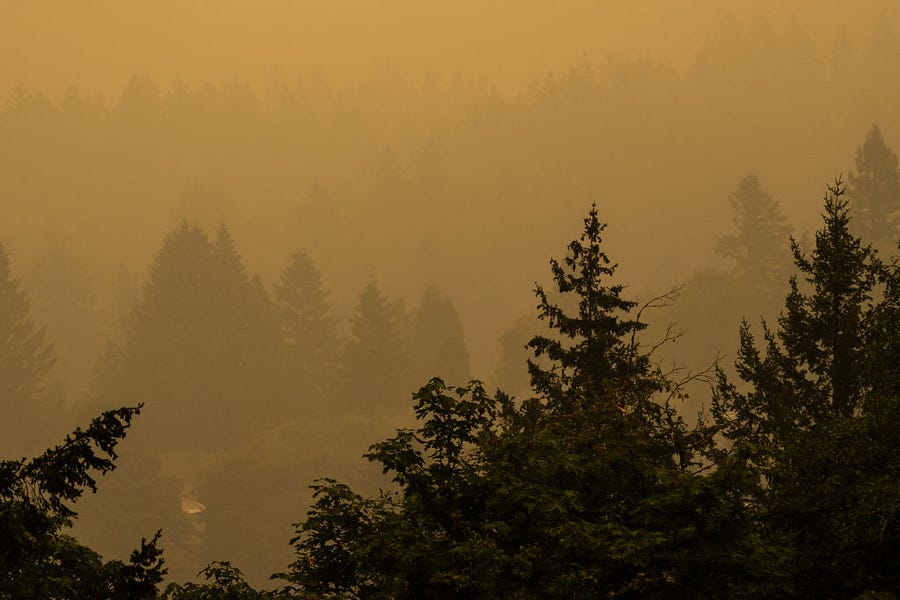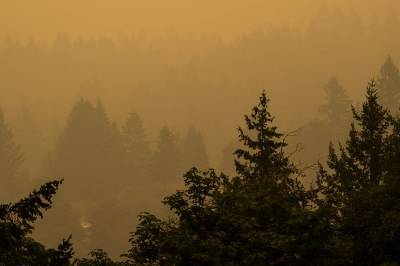For more than a week, my home state of Oregon has been consumed by the wildfires that have eaten up large swaths of the American West. Entire towns have been reduced to embers in a matter of hours, leaving at least 33 dead with many dozens more missing. Upward of 40,000 Oregonians have fled their homes: residents in counties on the outskirts of Portland have faced a series of mandatory evacuation orders, and many others have left voluntarily due to the hazardously toxic smoke-filled air, which is currently the worst in the world. Fires around the state continue to rage unabated, overwhelming firefighters and leading to Gov. Kate Brown’s invocation of emergency powers. Local officials predict a “mass fatality incident”—the worst loss of life from fire, in Brown’s own words, in the state’s history.
Initially, my family and I felt insulated from all of this: Our 8,000-odd person town of Hood River, sitting in the mountainous Oregon farmland an hour or so east of Portland, has been somewhat removed from the chaos of 2020—rural America is used to thinking of itself as existing in an entirely different world from our cities. So the wildfires began as an abstraction for us, as most natural disasters are for most people. The apocalyptic images of ruby-red skies over California struck us as tragic, but distant.
But in the early hours of Friday morning, I woke up with the taste of fire in my mouth and found it difficult to breathe; my parents had been awake for the same reason since 1:30 a.m. The circulation in our house, a cheap one-story manufactured home, did little to protect against the heavy, hot smoke that had crept up through the Columbia River Gorge and settled on our town. By that evening, we had joined our 40,000 fellow Oregonian émigrés, the three of us and our dog—my little brother was fortuitously absent, having left for his freshman year of college a week before; I’m taking my senior fall semester online—packing up the Subaru Outback and setting out for Idaho.
It’s unclear when exactly we’ll be able to go home, but we count ourselves lucky; it’s highly unlikely that our house will burn, in contrast to towns to the south which have disappeared altogether. We’re safe, as are our friends and family still in Oregon; we work jobs that are easily done via laptops and Zoom calls; and we’re financially well-off enough to leave town and stay in a hotel for a week. (Although far too cheap to shell out for more than one room, meaning that all of us have been relegated to the same confined space for days now—a serious test of our collective familial bond.)
The burning itself continues, accompanied by the predictable partisan commentary. As it pertains to the wildfires, the political controversy du jour is climate change—specifically, to what degree warming global temperatures are to blame for the disastrous recent destruction, and how indicative ongoing events are of an impending climate apocalypse. Like with most issues, the truth of the matter is complicated—and the state of our contemporary discourse often lacks the nuance to fully discuss it.
California Gov. Gavin Newsom, to take a prominent example, has been one of the leading proponents of the idea that climate change is the main culprit for the wildfires, linking the ongoing chaos in his own state to the “climate damn emergency” and even getting into a face-to-face tiff with the president about the issue at a joint press conference on Monday. Newsom’s rhetoric has been echoed by other Democratic politicians and the legacy media for weeks—the front page of the Sunday Los Angeles Times featured an imposing photograph of a masked man standing amidst the remains of a destroyed house, with the bold-font title: “California’s climate apocalypse.” (The subhed reads “Fires, heat, air pollution: The calamity is no longer in the future—it’s here, now”).
Partisans on the right have largely responded by mocking the left’s alarmist tone, arguing that badly designed regulatory environments and decades of badly designed forest policies are responsible for the fires. The Wall Street Journal editorial board ran an op-ed titled “Biden of the Climate Apocalypse,” deriding the former vice president for giving a speech depicting the wildfires as the manifestation of “the fury of climate change everywhere” without once mentioning the problem of forest mismanagement. The Journal accused Biden of giving “a speech that claims to revere science but is utterly detached from it,” writing that “on the wildfires, Mr. Biden’s failure to mention the need to clear dry and diseased fallen trees defies what has gradually been recognized as a necessity even on the environmental left.”
It’s difficult to parse the two variables—climate change and forest management—apart from one another when diagnosing root causes, but the size and ferocity of the fires appears to be unavoidably tied to the decades of ill-fated environmental policies at the hands of state and federal agencies. To his credit, Gov. Newsom admitted as much, telling President Trump in the Monday conference that “there’s no question” that “we have not done justice on our forest management,” though he still maintained that climate change was fundamentally the root cause of the issue. Oregon Democratic Sen. Ron Wyden, too, gave a speech on the Senate floor earlier this week saying that the fires were “debt coming due” on decades of “lousy” forest policy. But others, like Biden and Gov. Brown, have been more reticent to admit that anything but climate change is responsible for the disaster.
Part of the latter group’s unwillingness to attribute the fires to policy failures is the fact that it would require local governments in states like Oregon to take responsibility for the years of mismanagement that gave rise to the current issues. Acknowledging this would also mean an implicit admission of a more fundamental problem with left-wing environmentalist thinking, which sees preservation—cordoning off large segments of wilderness from any human interaction whatsoever—rather than conservation—responsible stewardship through engagement with the land, controlled burns, preemptive logging and deforestation, and so on—as the preferred approach to environmentalism. As Julie Parrish, a former Oregon state representative and a founding board member of the Timber Unity Association, wrote in a Saturday Washington Post op-ed:
In recent decades, political power in Oregon has accumulated in urban Portland and its surrounding suburbs. Residents of these areas—insulated from the dangers of land mismanagement—have insisted on preserving the forests as untouchable playgrounds. Since 2001, the state has over-prioritized recreation and environmentalist concerns such as ecotourism. As a result, Oregon’s forests were allowed to become overgrown, creating fire hazards. The state has screwed up so badly that, in November last year, it was ordered by a jury to pay Oregon’s rural counties $1.1 billion for failing to uphold its contractual obligations for responsible forest management.
Insofar as they admit to such policy failures, left-leaning politicians and media commentators have laid the blame at the president’s feet: As both Democratic state lawmakers and a flurry of articles and “fact checks” have rushed to point out, well over half of the burn areas in the West have occurred on federally controlled land. It stands to reason, this argument posits, that the wildfires are therefore the result of bad federal policy from the White House—not from Democratic states like Oregon and California. But the current administration can hardly be blamed for the accumulation of decades of bad policies, many of which were, in fact, encouraged and sanctioned by state governments. For all of the president’s manifest shortcomings, forest policy has not been one of them; in fact, by all accounts, his administration’s response to the ongoing fires has actually been quite good.
There are a host of other avoidable policy-related issues that have contributed to the explosive nature of the fires: Counterintuitively, for example, a patchwork of badly designed state environmental regulations forwarding “preservationist” restrictionism has made it both difficult and expensive for private citizens to clear away dead trees and brush on their own land. But all of this is not to say that climate change does not play an important role in the ongoing fires. Newsom’s claim that the wildfires are exacerbated by the fact that “the hots are getting hotter” and “the dries are getting dryer” is absolutely true—not to mention the fact that summers aren’t just hotter, but longer, creating a larger window of time within which fire risk is high. Longer and more intense heat waves cause vegetation to dry out, creating increasingly flammable conditions. To say that climate change is not the sole issue is not to say that it isn’t an issue; it clearly is.
Our ability to avoid disastrous situations like the one currently engulfing the Western United States is impeded by partisans on both sides refusing to acknowledge the complexities of the issue—one can push common-sense climate policies alongside repealing onerous government regulation. The two are far from mutually exclusive.
Nate Hochman (@njhochman) is a senior at Colorado College and a former ISI summer fellow at The Dispatch.
Photograph by Nathan Howard/Getty Images.






Please note that we at The Dispatch hold ourselves, our work, and our commenters to a higher standard than other places on the internet. We welcome comments that foster genuine debate or discussion—including comments critical of us or our work—but responses that include ad hominem attacks on fellow Dispatch members or are intended to stoke fear and anger may be moderated.
With your membership, you only have the ability to comment on The Morning Dispatch articles. Consider upgrading to join the conversation everywhere.